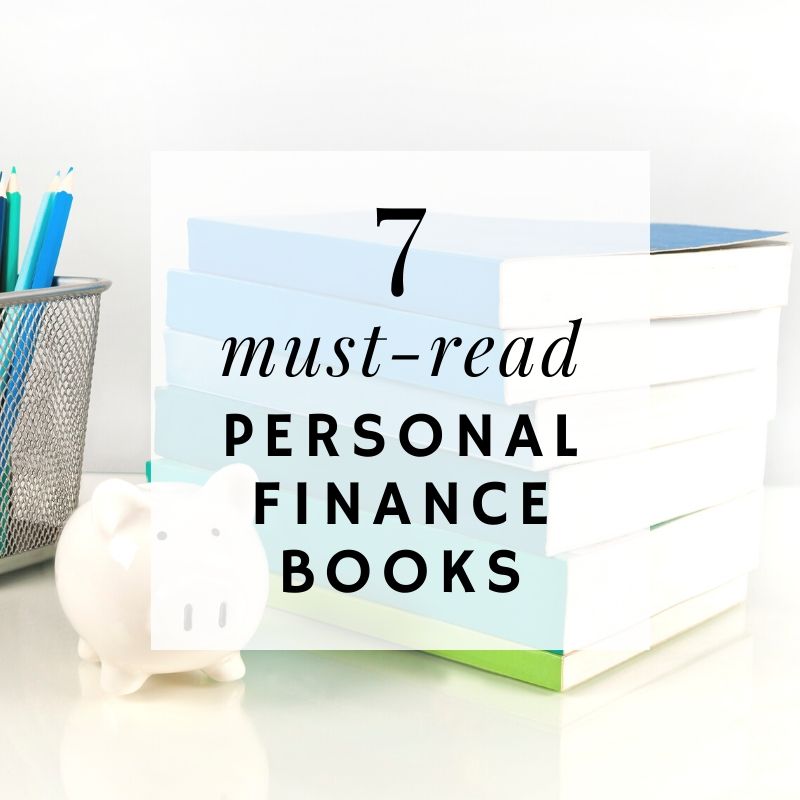This list of personal finance books are a must read for anybody wanting to take control of their financial future.
It is unfortunate that personal finance is not taught in schools. But lucky for us, there are a ton of good books out there for us to learn from.
Read below for my top 7 must read personal finance books.

I am the type of person that likes to read as much as possible about a topic that interests me, so when I finally decided to take charge of my finances I started reading everything I could get my hands on.
I started reading articles, blogs, and news stories but they didn’t provide the information or satisfaction I get from reading a great book.
The following is a list of personal finance books I have read and highly recommend – these are must read for anyone looking to take control of their financial future.
I organized them in order of different stages of financial situations – from getting out of debt to saving to investing.
For convenience, I’ve linked to the Amazon page for each book, but I highly recommend you try to find them in your public library first.
This post contains affiliate links. As an Amazon associate, I earn from qualifying purchases.
7 Must Read Personal Finance Books
1. The Total Money Makeover by Dave Ramsey
by Dave Ramsey
The Total Money Makeover is the book that helped me get out of debt.
Ramsey has a common sense approach to personal finance that sometimes gets criticized but it has been proven to work.
His method is a series of baby steps that slowly guide you towards financial independence.
He is very passionate about avoiding all type of debt (credit cards, car payments, even mortgage in some situations) and always paying cash. Though I disagree with his stance on credit cards, I highly recommend The Total Money Makeover because his system has been proven to work – it sure did for me.
As a devoted Christian, he references passages of the Bible to drive his point but it is a great book even for non-Christians – he doesn’t try to convert anybody. Actually, he tries to convert you from being broke to having money, so I take that back.
Get The Total Money Makeover here.

2. How to Get Out of Debt, Stay Out of Debt, and Live Prosperously by Jerrold Mundis
by Jerrold Mundis
How to Get Out of Debt, Stay Out of Debt, and Live Prosperously is based on the principles and techniques of Debtors Anonymous.
Mundis, being a debtor himself, based this book on his own struggles with debt.
How to Get Out of Debt is not a book about investing or how to get rich quick and it also doesn’t give you specific financial advice – it concentrates on the perils of debt and how you can beat them by developing a healthy relationship with money.
How to Get Out of Debt was first published in 1988 (it has been revised and updated since), but the information in it is truly timeless. I love that this books is filled with great tips from real people that struggled with debt and not from rich financial experts that have never struggled with debt.
3. The Richest Man in Babylon by George Clason
by George Clason
The Richest Man in Babylon is another book that is timeless. It was first written in the 1920s but it has been the foundation of financial success for many.
The Richest Man in Babylon is written in parables and follows the stories of a few characters and how they became the richest men in the richest city of the ancient world.
In it, Clanson writes about the Seven Cures for a Lean Purse and provides a guide to follow for financial independence. He raves about keeping some of what you earn and use compounding to your favor.
The Richest Man has been hailed as one of the greatest inspirational books on saving, financial planning and personal wealth.
It is the shortest book I’ve read on the subject – under 150 pages – but it is filled with great information and overall advice on how to live your life.
Get The Richest Man in Babylon here.

4. The Millionaire Next Door by Thomas J. Stanley and William D. Danko
by Thomas J. Stanley and William D. Danko
In The Millionaire Next Door, Stanley and Danko interviewed and surveyed thousands of millionaires for over 20 years to try to find out if there was a behavioral connection between millionaires.
Their findings were surprising.
They first started surveying people in upscale neighborhoods but quickly found out that many people that live in expensive homes and drive luxury cars don’t actually have much wealth. What they found was that many people that have a great deal of wealth don’t live in upscale neighborhoods, they live “next door.”
In The Millionaire Next Door, the authors identify seven key common traits among those who have accumulated wealth. They also show how wealth is not related to how much money you make.
It is an eye opener to those who think that being wealthy is about how much stuff you have, or how big your house is.
This book is highly recommended if you want to learn a thing or two about how real millionaires live.
Get The Millionaire Next Door here.

5. The Bogleheads’ Guide to Investing by Taylor Larimore, Mel Lindauer, and Michael LeBoeuf
by Taylor Larimore, Mel Lindauer, and Michael LeBoeuf
The authors of The Bogleheads’ Guide to Investing are pupils of Vanguard founder John Bogle and they preach about indexed mutual funds.
The “Bogleheads” have decades of experience teaching about diversification and asset allocation within our retirement accounts and other investment accounts. The book tackles a variety of topics from the basics of investing to just about any investment topic an investor would want to know about.
If you need help understanding why index mutual funds are the way to go, then The Bogleheads’ Guide to Investing is the book you need.
The authors offer practical advice that regardless of age or net worth will help you decrease your worries and increase the profits on the investments you make.
Get The Bogleheads’ Guide to Investing here.
6. A Random Walk Down Wall Street by Burton Malkiel
by Burton Malkiel
A Random Walk Down Wall Street is a little more technical than the Bogleheads’ Guide, but if you want to learn more about investing, this is the best book.
Malkiel illustrates why day trading is a bad idea and how a long term approach is the right way to invest.
The book not only shows you what to look for when investing, but it also talks about all the major market downturns and why they happened.
Malkiel does a great job explaining the different schools of thought when it comes to investing and breaks down the pros and cons of each.
Malkiel describes why investors are better off buying and holding onto index mutual funds than risking all their money trying to time the market.
He also shows concrete data on how index mutual funds have outperformed actively managed funds time and time again.

7. Your Money and Your Brain by Jason Zweig
by Jason Zweig
Your Money and Your Brain guides us through the new science of neuroeconomics, which studies the effects money has on people.
Jason Zweig covers the latest research on how money affects our emotions. This book takes a science based approach into how our brains react to different money situations – for example, how gains provide cocaine-like highs and losses provide depression-like lows.
Your Money and Your Brain also goes into detail about how corporations use tactics to influence your desire to buy their products.
It is a great read, full of interesting research done on the psychology of money. I love that at the end of each chapter, the author provides advice on how to overcome our genetic predispositions by putting rules in place before making any investment decisions.
The book has tons of research, but it is not too “sciencey.” Zweig does a great job explaining the science behind it and gives everyday examples to make things even easier to understand.
Get Your Money and Your Brain here.
Get educated
These are just a few books on the countless personal finance books that have been written.
I have a list of about 20 more books that have been recommended but I just haven’t had the time to read them all. Your Money or Your Life by Dominguez and Robin and All Your Worth
by Elizabeth Warren (Yes, now United States Senator Warren) are on my short list of books to read.
Even though I recommend all the books in this list, I don’t recommend that you follow any of them word for word. These personal finance books are just a learning guide to be able to make more informed decisions about our finances.
What are your favorite personal finance books? Let me know in the comments below. I’d love to add more books to my list so don’t be shy.
Know someone who is wondering which personal finance books to start with? Share this list with them using the share buttons below! And don’t forget to save it for later on Pinterest:














I’ve heard a lot about A Random Walk Down Wall Street. As a matter of fact, the guy who wrote it started an investment research and management tool…I wish I remembered the name of the tool. Anyway, I really am going to have to check that book out! Thanks for a great list!
I decided to read A Random Walk because it was constantly being recommended by people in the field. Time and time again this book came up. I have to tell you that I’m so glad I read it because it has tons of good information in it.
If you have the chance to swing by the library, make sure to pick it up – it’s a good read.
I’ll have to check a few of this out. Thanks for the list. One of my favorites is The Investment Answer by Daniel Goldie and Gordon Murray.
Thanks for the suggestion Julie. I added it to my list.
I have read most of the books listed above and I love The richest man in Babylon, I like a little story with my personal finance so it fits perfect. I also enjoyed reading The Wealthy Barber, same thing kind of a personal finance book with a story, gets me every time.